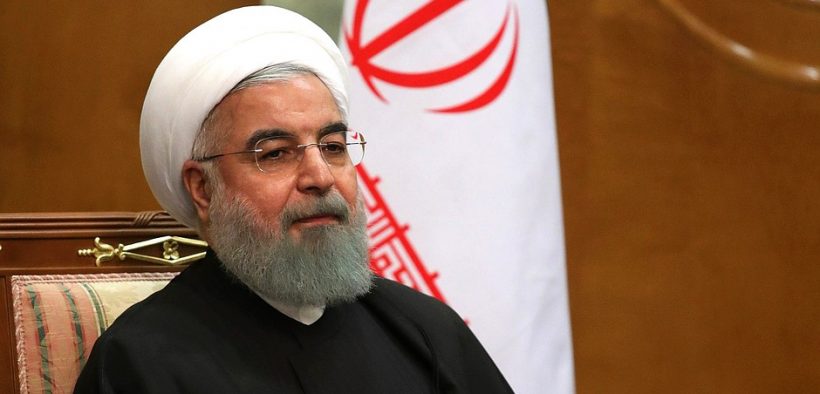The US Is Sleepwalking Into a Real War With Iran

The U.S. plans for a naval armada in Hormuz will run against the Laws of Seas and Iran’s sovereignty over its territorial waters. We are now sleepwalking to a new war in the region with disastrous consequences.
The stage is now set for a disastrous collision between the U.S.-UK navies and Iran in the busy waters of the Strait of Hormuz. The Strait connects the Persian Gulf to the Arabian Sea and makes up the world’s major oil choke point, carrying about 30-35 percent of total traded oil. The latest move of the U.S. and UK—to provide “protection” with their warships to merchant vessels in the Strait of Hormuz—is an assertion of imperial rights over Iran’s territorial waters. In other words, this is what would have been called, in an earlier era, gunboat diplomacy. Iran will not accept this.
This round of escalation began with the seizure of tankers, first by the UK and later by Iran. Both seizures took place in waterways so narrow that they are within the 12-nautical mile limit of territorial waters of the countries bordering them. The Strait of Gibraltar is only 7 nautical miles wide, while the Strait of Hormuz is 21 nautical miles wide. If vessels are to transit using only international waters, a waterway must have a width of at least 24 nautical miles plus another 6. The additional 6 nautical miles have to provide two lanes for traffic each way, with each lane 2 nautical miles wide, and a 2-nautical mile channel separating the two lanes.
What happens if waterways such as the Strait of Hormuz are so narrow that they do not have international waters for the passage of ships? Can Iran then claim, as a coastal state, that it has the right to decide who uses the strait since it falls under its territorial waters? This is one of the issues addressed by the UN Convention on the Law of the Sea (UNCLOS), which was adopted in 1982 and came into effect in 1994. It allows innocent passage of ships—both civilian and military—through such straits. The catch is “innocent passage,” as defined in Article 19(2). If Iran deems that the U.S.-UK warships “protecting” tankers are, in fact, threatening Iran, or are involved in spying missions, or are interfering with its communication systems, it has the right to bar their passage.
Iran is a signatory to UNCLOS with the caveat that it will not extend the rights under the treaty to non-signatories. The U.S., though fully involved in the negotiations, refused to sign or ratify UNCLOS. The Paris Climate Change Agreement and the Joint Comprehensive Plan of Action (JCPOA) are not the only treaties that the U.S. negotiated only to walk out of them.
So what does the U.S. accept as its navigation rights? The U.S. does pay lip service to UNCLOS. But in 1982, the same year UNCLOS was signed, the U.S. drew up a set of rights based on what it calls customary rights. It “implements” these rights under a Freedom of Navigation (FON) Program and conducts Operations (FONOPS) in any part of the world it deems fit. It’s as if the U.S. is asserting its “right,” as the preeminent naval power in the world, to do what it wants anywhere. In the colonial era, “enforcing” such rights of imperial powers used to be called gunboat diplomacy. Now it is called FONOPS.
The attempt by the U.S. and UK to control the Strait of Hormuz with its warships challenges Iran’s rights over the strait. Under UNCLOS, Iran can claim that the U.S. and UK warships cannot exercise the right of innocent passage through the strait in the name of providing security to merchant vessels. Simply put, no country can seize Iran’s ships, stop its oil exports, and yet claim that it can post a naval armada in Iran’s territorial waters under the guise of innocent passage.
Of course, Iran’s larger logic articulated by President Hassan Rouhani is quite simple: either all countries have security for their oil exports through the strait, or no country will.
This brings us back to the start of the new tanker war. It began with the UK’s seizure of the tanker Grace 1 with 2 million barrels of crude oil in the Strait of Gibraltar, claiming EU Sanctions. Iran responded by capturing a UK-flagged tanker, Stena Impero, in the Strait of Hormuz, claiming violations of maritime law.
The UK claims that it seized Grace 1 under EU sanctions on Syria, the same EU that it is Brexiting in a hurry. Most commentators now accept that the UK acted to implement the U.S. sanctions on Iran, not EU sanctions. The UK’s legal right to seize either ships or goods in transit through the Strait of Gibraltar is highly debatable. It is Iran’s oil; and even if it is going to Syria as the UK claims, Syria is not under UN sanctions, the only legal international sanctions that count.
The European External Action Service, the EU body responsible for its foreign policy, was deafening in its silence on the UK action, supposedly taken to enforce EU sanctions. Even Carl Bildt, the co-chair of the European council on foreign relations, was constrained to tweet, “…One refers to EU sanctions against Syria, but Iran is not a member of EU. And EU as a principle doesn’t impose its sanctions on others. That’s what the US does.”
Iran has claimed that Stena Impero, the British tanker, was seized as it hit a fishing boat, seriously injured fishermen and ignored the boat’s distress calls. When confronted by Iranian patrol boats, Stena Impero illegally switched off its transponder, and attempted a U-turn that took it on the opposite side of the transit channel, endangering other ships. Hence the Iranian Guards seized the ship to face charges in Iranian courts for violating maritime law and rules of transit in the strait.
Are the Iranian claims credible? Or have the facts been “manufactured” to justify a tit-for-tat response to the UK? Iran at least has jurisdiction if there was indeed a maritime violation in the strait. The UK’s jurisdiction for seizing Grace 1 rests on far more tenuous grounds.
The current Iran crisis may have begun with Trump pulling out of the Iran nuclear deal. But his reason for abandoning the deal is neither Iran’s nuclear capability nor its nuclear energy program. Trump believes that the U.S., through “maximum pressure”—read economic war—can force Iran to surrender. The three demands at the core of the Trump-Pompeo twelve demands are: 1) give up nuclear technology; 2) give up missile capability; 3) withdraw support to countries or groups outside your borders. This is asking Iran to disarm; not develop any advanced technology as nuclear and missile technologies are both dual-use technologies; and abandon its right to conduct an independent foreign policy. In other words, the demands spell out the death knell of Iran as an independent nation.
The U.S. proposed a new “coalition of the willing” to create a naval armada to control the Strait of Hormuz. Its European allies—even the UK—are wary of joining such an armada. Though the UK is talking about protecting its ships independent of the U.S., its navy today is too weak to perform this task: it cannot match Iran’s firepower in Iranian waters. However, the UK does have a symbolic value if it joins the U.S. naval operations. With a hard Brexit looming over the horizon, the UK desperately needs a favorable U.S. trade deal; this may force it to join the U.S. naval misadventure in the straits.
Why do I call it a naval misadventure? I do not believe that the U.S., in a conventional war, can fully neutralize Iranian missile batteries, submarines and naval boats, and establish complete control over the straits. Iran can fight an asymmetric war—in which its only objective is to close the straits, not “win.” The U.S. will not only have to keep the straits open, but also protect all the shipping including the 15-odd Very Large Crude Carriers (VLCCs) that transit the straits every day. Even if one of these tankers is hit, the impact will be catastrophic—not only on the marine environment, but also on shippers and their insurance. Gunboat diplomacy can only take the U.S. so far. In today’s interdependent world, the only recourse is real diplomacy.
Are we close to a war over the U.S.-Iran standoff? If we follow the Doomsday Clock of the Atomic Scientists with a similar one for oil, we are probably one minute to midnight. For the world, particularly South, Southeast and East Asia, a war in the region that provides the bulk of its oil will be devastating. Why then are we sleepwalking into another war there?
This article was produced in partnership by Newsclick and Globetrotter, a project of the Independent Media Institute.




















This article completely ignores what Iran has been doing, and that is destabilizing the entire Middle East. Would anybody with his or her right mind trust the fanatics of the Iran regime with nuclear weapons? The last nuclear agreement was breached by Iran, secretly advancing their nuclear aspirations, it only pushed up the problem for a certain number of years, and by then Iran would’ve long had their bombs completed, same a North Korea did, so now is the last chance to stand up to these fanatics
Who’s destabilizing the Middle East? It is and always has been the UK, France, USA, and the fanatical zionist colony in Palestine.